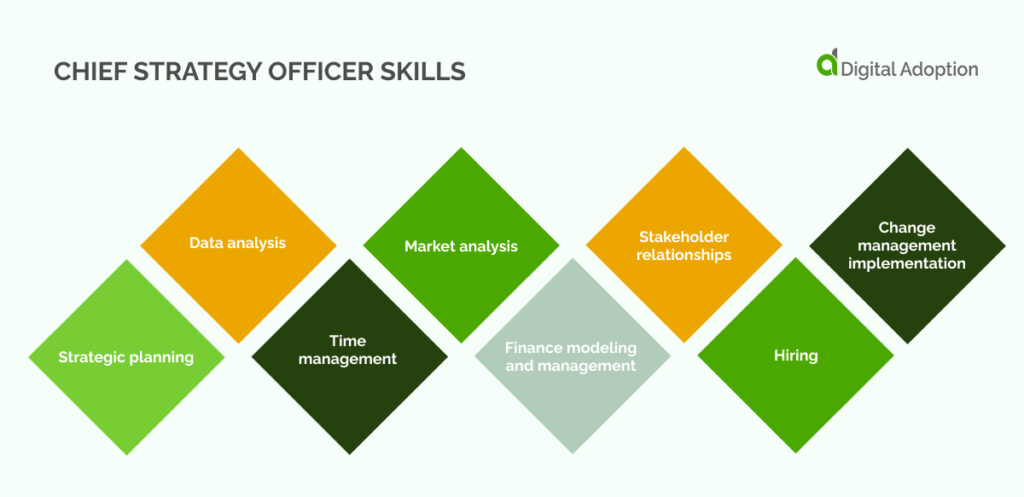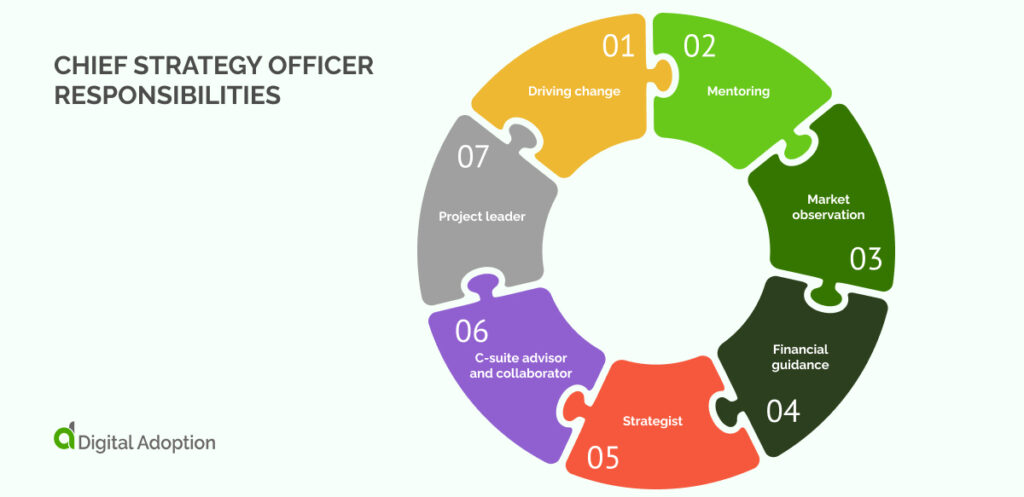All the resources in the world are useless without direction, focus, and coordination to succeed in strategic initiatives and digital transformation.
That’s where your chief strategy officer (CSO) comes in. They create value and coordinate actions for your enterprise by following IT strategic trends and implementing them into each digital business strategy.
Whatever enterprises and CSOs are doing, it isn’t enough for strategies to be successful. 94% of employees think their board of directors should pursue a more strategic approach, and their concerns are well founded because 90% of transformative planning efforts in 2023 fell short of their goals.
This article defines the chief strategy officer and establishes skills and responsibilities. Knowing the CSO’s skills and responsibilities helps boards of directors ensure that CSOs have all the tools they need to achieve their goals and make their organization successful using a focused strategy.
What is a chief strategy officer?
The chief strategy officer (CSO) is a C-suite executive who develops, facilitates, and shares the organization’s strategic initiatives and goals.
They report to other C-suites, like the CEO (chief executive officer) and CFO (chief financial officer), and work alongside them, the senior leadership team and the board of directors to formulate the enterprise’s long—and short-term strategic initiatives and guide them through the planning process to completion and success.
The CSO aligns resources, goals, and actions, ensuring cohesive direction, competitive advantage, and sustainable organizational success.
Chief strategy officer skills

Strategy is a broad concept, so the CSO must have a comprehensive, all-encompassing range of skills to fulfill their role as they prioritize digital initiatives. A CSO’s hard and technical skills are problem-solving, time management, and data analysis. Still, several softer skills are necessary, such as stakeholder management, hiring, and change management implementation.
Strategic planning
Strategic planning defines an organization’s direction by setting goals, determining actions to achieve them, and mobilizing resources. For a CSO, it means shaping and guiding the company’s long-term vision and direction for sustainable growth and competitive advantage.
Strategic planning is crucial as it offers a clear roadmap for achieving long-term goals, aligns resources with objectives, and allows proactive management of opportunities and challenges, ensuring sustained growth and competitiveness.
CSOs achieve strategic planning by establishing clear, measurable goals that align with their organization’s vision. They also conduct a SWOT analysis, engage stakeholders, utilize data, adopt an agile approach, and regularly review progress.
Data analysis
Data analytics tools like Tableau and Power BI allow CSOs to visualize, analyze, and interpret large datasets, transforming raw data into actionable insights via interactive dashboards and reports. These tools support strategic decision-making, trend identification, and business innovation.
Data analytics tools are crucial to helping CSOs make informed decisions, identify market trends, optimize operations, forecast outcomes, and align strategies with business goals and market dynamics.
CSOs can enhance Tableau and Power BI skills by pursuing continuous learning, implementing strong data governance, adopting best practices, integrating AI, fostering collaboration, and staying updated with the latest tool advancements.
Time management
The chief strategy led a project meeting a tight deadline by prioritizing tasks and optimizing team schedules.
Time management is essential for a CSO to prioritize tasks, meet deadlines, and manage multiple strategic initiatives efficiently. It ensures that critical projects progress on schedule and teams effectively utilize resources.
The CSO demonstrates this skill by setting clear priorities, scheduling tasks, delegating responsibilities, and maintaining a structured workflow to achieve strategic goals and respond promptly to emerging issues.
Market analysis
Market analysis for a CSO involves evaluating the market size, trends, and competitive landscape to inform strategic decisions, identify opportunities, and assess risks. It provides insights into industry trends, customer needs, and competition, enabling informed decision-making and risk management.
CSOs practice these market analysis skills by leveraging advanced analytics tools and big data for deeper insights into trends, customer behavior, and competition. They also implement competitive intelligence practices, use customer feedback and social media analytics, and adopt scenario planning to anticipate market changes.
The best CSOs implement continuous learning, promote cross-functional collaboration, and utilize external consultancies for specialized insights. These practices enhance market analysis effectiveness and support strategic decision-making and long-term planning.
Finance modeling and management
Financial modeling helps CSOs forecast financial performance, make strategic decisions, assess viability, and plan growth. It’s crucial for informed decision-making and risk management through a quantitative framework.
CSOs constantly enhance accuracy and strategic insight by mastering advanced Excel functions, adopting industry-standard practices, and integrating strategic planning elements into models.
They use advanced financial modeling software, stay updated with the latest trends and technologies, practice scenario analysis, and seek regular feedback. These steps improve financial modeling skills, leading to better strategic decisions and outcomes.
Stakeholder relationships
Stakeholder engagement for a CSO involves identifying, communicating with, and involving individuals or groups impacted by the organization’s strategies. It aims to align expectations, garner support, and mitigate risks in executing strategic initiatives.
This process ensures that chief strategy officers back up strategic plans with feasible, broadly supported, actionable data.
For a CSO, stakeholder engagement ensures the inclusion of diverse perspectives, aligns strategies with expectations, and promotes collaboration for effective, sustainable goal achievement.
CSOs enhance stakeholder engagement by strategically communicating, understanding needs, and building trust. They also prioritize stakeholders, gather insights through surveys and meetings, develop tailored plans, involve them in decisions, and adopt strategies for better outcomes.
Hiring
The chief strategy recruited top talent, filling critical roles that enhanced the company’s capabilities and innovation.
Hiring a Chief Strategy Officer (CSO) is crucial as it builds a capable team to drive strategic initiatives and innovation. A well-selected team enhances organizational performance and aligns with strategic goals, leading to competitive advantage.
The CSO carries out this skill by defining role requirements, conducting rigorous interviews, assessing candidates’ alignment with company values, and ensuring they onboard the right talent in partnership with HR to meet strategic objectives.
Change management implementation
Chief strategy officers successfully guide the company through a digital transformation, using their change management skills to ensure smooth adoption and minimal disruption.
For a Chief Strategy Officer (CSO), it involves planning, implementing, and monitoring change initiatives to align operations with strategic objectives.
Effective change management is crucial for smoothly implementing strategic initiatives, reducing resistance, and efficiently achieving desired outcomes. Thus, it safeguards the organization’s competitive advantage and ensures future success.
To enhance their Change Management skills, CSOs should define clear objectives aligned with strategic goals, engage stakeholders early, develop a comprehensive communication plan, provide training and support, monitor progress with metrics, and celebrate successes.
Frameworks like Prosci’s ADKAR Model and Kotter’s 8-Step Process can guide these efforts.
Check these skills against your current CSO. Are they achieving in all the ways these ideals suggest they should? If not, discuss with them how to optimize their performance.
If they find it challenging to demonstrate specific skills, discuss the challenges and offer support to expand their skills, which will help your organization outcompete other companies in your market.
Chief strategy officer responsibilities

Chief strategy officers’ responsibilities range from mentoring team members and managers to driving change and observing market changes to ensure they focus on successful strategies that help the whole organization succeed.
Driving change
A new strategy means change. And that usually doesn’t sit well with employees who have been carrying out their tasks the same way for several years.
The Chief Strategy Officer (CSO) drives change by leading the development and execution of strategic initiatives, adapting strategies to evolving market conditions, and managing organizational transitions to support teams in understanding the value changes.
This responsibility is crucial for the CSO to ensure that the company remains competitive, aligns with strategic goals, and responds effectively to industry shifts.
For the organization, driving change is essential to stay relevant, capitalize on new opportunities, and sustain growth, ultimately achieving long-term success and maintaining a competitive advantage.
Mentoring
In this role, the CSO defines the organization’s strategic priorities and guides the CEO and other C-suite executives, such as the chief operating officer and CTO (chief technology officer).
Mentoring is crucial for a CSO to develop future leaders and build a strong organizational culture. It impacts the organization by enhancing employee skills, boosting morale, and ensuring continuity in leadership.
The CSO fulfills this role by providing guidance, sharing knowledge, and supporting professional development.
This process involves setting up mentorship programs, offering regular feedback, and encouraging career growth, which helps align the team’s efforts with strategic objectives.
Market observation
The CSO monitors the market and competitors, looking for external opportunities and risks that could affect the organization.
Market observation is essential for a CSO to stay informed about industry trends, competitor actions, and emerging opportunities. This responsibility impacts the organization by enabling proactive adjustments to strategies and identifying areas for growth or innovation.
The CSO executes this by analyzing market data, monitoring industry reports, attending conferences, and engaging with industry experts. This approach supports data-driven decisions and maintains a competitive edge.
Financial guidance
The CSO partners with the CFO and other financial leaders to understand the budgetary impact and requirements of strategic priorities.
The CSO provides financial guidance by analyzing financial reports, setting budget priorities, advising on investment opportunities, and ensuring alignment between financial strategies and overall business objectives.
This responsibility impacts the organization by optimizing financial performance, managing risks, and aligning investments with strategic goals.
Financial guidance is crucial for a Chief Strategy Officer (CSO) as it ensures strategic decisions are grounded in economic realities, supporting sustainable growth and resource allocation.
Strategist
A CSO is responsible for creating and implementing strategies aligning with the company’s standards. Reporting directly to the CEO, the CSO carefully develops business strategies to drive growth, innovation, and sustainability.
They lead strategy formulation and execution, analyze market trends, oversee competitive analysis, and promote cross-departmental collaboration.
With strong leadership and a deep understanding of industry dynamics, the CSO plays a crucial role in shaping the company’s future, establishing a competitive edge, and staying ahead of rivals.
C-suite advisor and collaborator
The CSO supports the CEO as a senior advisor on many executive activities, including board presentations and senior leadership workshops. The CSO also provides other executives with critical insights and strategic advice, ensuring cohesive decision-making and alignment across the leadership team.
The CSO executes this role by participating in executive meetings, offering strategic recommendations, and working closely with other C-suite members to integrate various departmental strategies into a coherent organizational plan. The CSO may also collaborate with the CIO (chief information officer) when conducting data analysis.
This responsibility impacts the organization by building a culture of teams that takes a unified approach to strategic challenges and opportunities.
Project leader
As a project leader, the CSO oversees critical strategic initiatives, ensuring teams complete on time and meet defined objectives. They also lead ad hoc, high-priority initiatives, providing strategic support and guidance.
The CSO carries out this responsibility by setting project goals, coordinating resources, managing teams, monitoring progress, and adjusting plans as necessary to ensure successful execution and alignment with overall strategic objectives.
Being a project leader allows Chief Strategy Officers to drive initiatives, manage resources, and ensure the successful implementation of strategic plans.
Leading projects will also enable CSOs to keep one foot on the ground regarding team members carrying out projects, keeping resource allocation and time scales realistic for what teams can achieve.
Consider these responsibilities when hiring a new CSO to ensure they will achieve their aims in your organization. You can also write these responsibilities onto a checklist to help your current CSO fulfill each. If they are failing in certain areas, use these responsibilities to support them in improving in specific areas of their role.
Chief strategy officers are expert collaborators
A CSO is at the top of the company and builds, facilitates, and implements strategies. However, achieving success for any strategic initiative takes many thousands of roles of different levels.
For strategic success, a CSO must excel at collaboration, which involves regular meetings, clear communication, and transparency.
Additionally, organizing cross-departmental workshops and team-building activities strengthens relationships and trust among team members.
When CSOs are expert collaborators on top of all their other skills and responsibilities, they increase their chances of strategic initiative success as collaboration promotes trust, cross-departmental working, and reduced silos.
This approach achieves higher revenue and a strong organizational reputation as the enterprise succeeds time after time.













